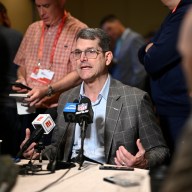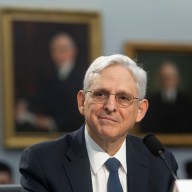
It didn’t take long after the Boston Marathon bombing for a small portion of the Internet to experience déjà vu. To the too few who saw the film, the tragic events sounded eerily like the ones in “Four Lions,” a pitch-black comedy in which — and this is true — a group of jihadists seek to set off bombs at a marathon.
Released in 2010, the film, directed by noted British satirist Chris Morris, suspiciously failed to generate outrage. It did moderate business in its native England, but earned only $304,616 in the United States, despite a plethora of critical raves.
The day after the attacks its notoriety was still only relatively muted. Slate noted the similarities— or at least noted that some on Twitter had noted them. The channel Film4 in Britain pulled an airing of the film for the Monday after the attack.
The differences between film and reality are many. The setting is London; the target is the London Marathon. As per the title, there aren’t two terrorists but four. (Originally there are five, but one is disposed of prematurely.) The “lions” don’t succeed, at least not as planned. And they have no hope for escape; they are suicide bombers who expect to be rewarded with a coterie of virgins (the number being disputed at points in the film) in a cozy after life.
But the similarities aren’t merely skin-deep. Following the chase online last Friday was, at least in spirit, like watching the finale in “Four Lions,” where cops chase men in way over their heads. (Our anti-heroes wind up running about the marathon dressed in silly costumes, one as one of the Teenage Mutant Ninja Turtles.) That Dzhokhar Tsarnaev wound up hiding, haphazardly, in some guy’s boat could have easily made it into the film.
The most obvious similarity — after the idea of bombing a marathon, that is — is the film’s most cogent satirical point: that the jihadists aren’t the most religiously devout but, for the most part, secularized. Like brothers Dzhohkar and Tamerlan Tsarnaev, the suicide bombers in “Lions” have largely succumbed to Western life. They rock out to rap. Only two dress in non-Western gear; one of these two (Nigel Lindsay) is a white convert. The smartest of the group — the one played by Riz Ahmed, currently starring as a suspected radical in Mira Nair’s “The Reluctant Fundamentalist” — has a family: his wife works at a hospital and he casually regales his son with stories of Allah rewarding martyrs.
The group’s motivations are vague, mostly hidden. On the few times their feelings are articulated they’re either mere hand-me-down anti-West boilerplate or inventively ridiculous. Lindsay’s Caucasian (that is, white, not from the Caucasus) blames car troubles on the usual target: “Jews invented spark plugs to control global traffic!” Most of the gang declines an offer to go to a suicide bomber training camp, and those that do wind up accidentally blowing up fellow jihadists with a rocket launcher while trying to take out a drone.
Meanwhile, the actually devout Muslim characters — the ones that tend to get racially profiled and whose mere image scares Middle America — are harmless, soccer-playing patsies. American agents whisper them off to a black site for rendition while the actual, non-devout characters are running around London dressed in silly costumes, wreaking bumbling havoc.
Morris spent three years researching the project, looking for not only jokes in a subject that Isn’t Funny, but also trying to get a deeper understanding of the larger issues. The distinction between the devoutly Muslim — portrayed as sexist, but not remotely murderous — and the actual terrorists — mostly stupid hotheads who’ve gotten themselves worked up into a collective lather — is made forcefully. This is not an anti-Muslim film; on the contrary. In the midst of prepping the film, Morris even wrote an op-ed, slamming those, like Martin Amis and Christopher Hitchens, who had let their religious skepticism turn them into Islamaphobic bigots.
As with the subject of terrorism, it’s worth repeating — over and over again, so that more of you will actually watch it — that all its points are made hilariously, not didactically. Finding humor in matters that aren’t humorous is one of Morris’ gifts, as is channeling very real anger into actually funny (and thought-provoking) jokes. “Four Lions” was his first feature film, but in England he has long been, on radio and television, (in)famous as the country’s most savage satirist. In the early 1990s, he was part of the all-star lineup of future comic legends — including Steve Coogan, Armando Iannucci and playwright Patrick Marber (“Closer”) — that created the absurdist fake news shows “On the Hour” (for radio) and “The Day Today” (for TV).
While most of the team headed to the spin-off for Coogan’s sports desk reporter Alan Partridge — about to get his first movie — Morris went solo. “Brass Eye” was his send-up of infotainment news shows (think “Inside Edition” or “A Current Affair”), which ginned up outrage for ratings. Wielding fake authority and ridiculous graphics, Morris would invent fake scandals then trick real celebrities into campaigning against them. Among those fooled were Alexandra Paul, Phil Collins and MP Graham Bright, who took to the floor of Parliament to denounce the made-up drug “cake.”
Morris’ most notorious moment wasn’t his comedy about terrorists, but the 2001 “Brass Eye” special on pedophilia, one of the craziest half-hours in television history. A record number of complaints flooded England’s Channel 4, denouncing the episode (some sight-unseen). But Morris’ intent wasn’t to mock fears of pedophilia; he had simply taken an issue everyone can agree isn’t, shall we say, good, then used it to explore hysteria.
“Four Lions” isn’t nearly as crazy. Its humor is more character-driven, the look and feel similar to the gritty hand-held dramas of fellow Englishman Ken Loach(of the new “The Angels’ Share”). Most of the jokes come from the five (then four, then fewer still) jihadists bickering, or revealing their stupidity, to the mounting frustration of the one (Ahmed) who actually has some smarts (even if they’re violently misdirected).
This is also a comedy where the biggest laughs involve completely innocent civilians needlessly killed. Nice (and not so nice) people are blown to bits in weirdly amusing ways, and Morris gets similarly uneasy laughs out of incompetent officials making things worse. A terrible negotiator (Benedict Cumberbatch) winds up only thoughtlessly stoking the homophobia in one terrorist, while the funniest scene may be the one where a sniper accidentally guns down a civilian dressed as Chewbacca, as he was told one of the suspects was dressed as a bear. Not being up on “Star Wars” knowledge will get innocents killed.
There’s probably no time when “Four Lions” couldn’t be judged as “too soon,” be it a fortnight after a terrorist attack, or even a handful of years. Morris clearly modeled it after “Dr. Strangelove, or: How I Learned to Stop Worrying and Love the Bomb,” which horrified not a small number of people, post-Bay of Pigs, living with a newfound fear of nuclear annihilation. But both films aim — to hopefully not make it sound too banal — to comfort people. They seek to make jokes on a topic that needs as many as it can get. And they hope to enlighten humanity on a subject too often treated with blind hysteria.
If or when you’re ready for it, “Four Lions” can currently be viewed on Netflix Instant and is on DVD/Blu-ray.













